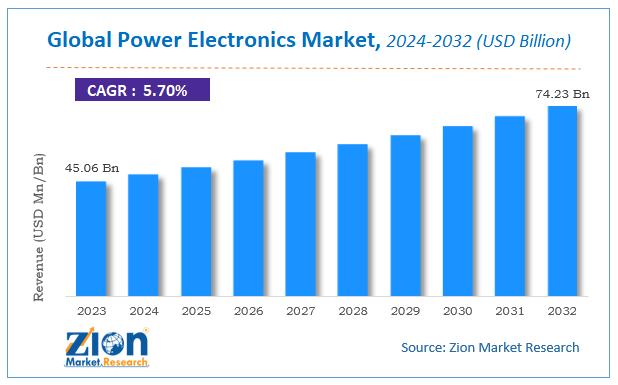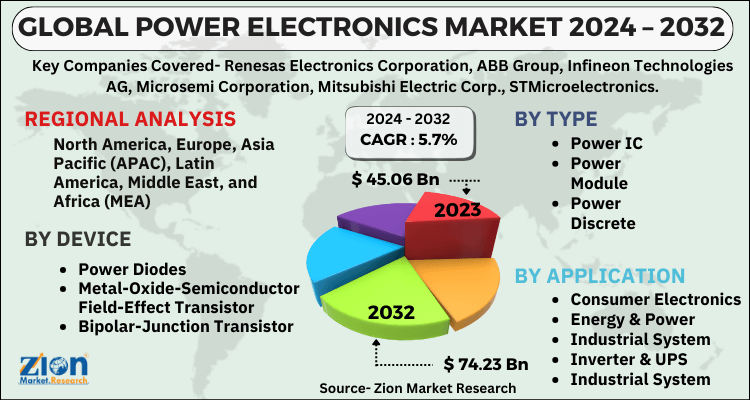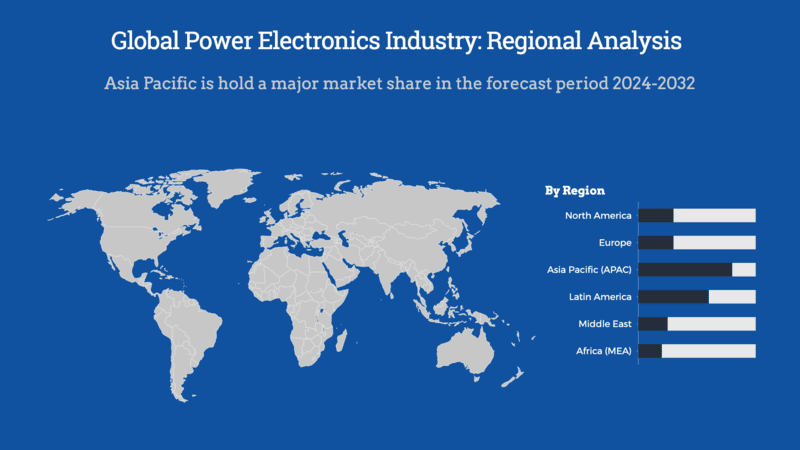Power Electronics Market Size, Share, Trends, Growth and Forecast 2032

Power Electronics Market - By Device (Power Diodes, Metal-Oxide-Semiconductor Field-Effect Transistor, Bipolar-Junction Transistor, Insulated-Gate Bipolar Transistor, and Thyristor), By Type (Power IC, Power Module, and Power Discrete), By Application (Consumer Electronics, Energy & Power, Industrial System, Inverter & UPS, Industrial System, And Others): Global Industry Perspective, Comprehensive Analysis and Forecast, 2023-2032
| Market Size in 2023 | Market Forecast in 2032 | CAGR (in %) | Base Year |
|---|---|---|---|
| USD 45.06 Billion | USD 74.23 Billion | 5.7% | 2023 |
Global Power Electronics Market Overview
The global Power Electronics Market size was worth around USD 45.06 Billion in 2023 and is predicted to grow to around USD 74.23 Billion by 2032 with a compound annual growth rate (CAGR) of roughly 5.7% between 2024 and 2032.
The global Power Electronics Market. The report offers valuation and analysis of Power Electronics market on a global as well as regional level. The study offers a comprehensive assessment of the industry competition, limitations, sales estimates, avenues, current & emerging trends, and industry-validated market data. The report offers historical data from 2018 to 2022 along with a forecast from 2023 to 2032 based on value (USD Billion).
The global power electronics market is a rapidly growing sector driven by the increasing demand for energy-efficient solutions and the widespread adoption of renewable energy sources. Power electronics involve the control and conversion of electric power using semiconductor devices like diodes, transistors, and thyristors.
Introduction
Power electronics is the application of solid state electronics and is utilized for controlling & transforming electric power. It is a branch of electronics that encompasses the analysis and designing of myriad circuits capable of transforming electrical energy into other form of energy. Additionally, power electronics make use of various equipment including semiconductor equipment, inductors, and capacitors. Furthermore, it assists the power management sector in improving the power conservation in consumer electronics, industrial systems, and electric vehicles. Additionally, power electronics has myriad applications in transport, automotive, defense & aviation, and consumer electronics goods sectors.
The Global Power Electronics Market plays a critical role in the modern industrial and consumer landscape by enabling efficient power conversion, control, and management. Power electronics involve the application of semiconductor devices such as diodes, transistors, and thyristors to control and convert electrical energy across various applications.
These technologies are essential for converting electricity from one form to another, ensuring energy efficiency, reliability, and performance in various systems. From renewable energy sources and electric vehicles (EVs) to consumer electronics and industrial automation, power electronics are at the heart of energy management solutions.
Importance of Power Electronics
- Power electronics facilitate the efficient use of electrical energy, reducing energy losses during conversion.
- They support the integration of renewable energy into the grid by ensuring stable energy transfer.
- Electric vehicles and hybrid systems heavily rely on power electronics for motor control and battery management.
Market Scope
The market encompasses various product types such as power modules, discrete devices, and integrated circuits. End-use industries include:
- Automotive (especially with the rise of EVs)
- Renewable Energy (solar inverters, wind energy converters)
- Consumer Electronics (smartphones, laptops, home appliances)
- Industrial Automation (robotics, manufacturing machinery)
- Aerospace & Defense
With increasing demand for energy efficiency and the global transition toward sustainable energy, the power electronics market is set for significant growth.
Key Insights
- As per the analysis shared by our research analyst, the global Power Electronics Market is estimated to grow annually at a CAGR of around 5.7% over the forecast period (2024-2032).
- In terms of revenue, the global Power Electronics Market size was valued at around USD 45.06 billion in 2023 and is projected to reach USD 74.23 billion by 2032.
- Based on the device, Power Discrete Devices this segment holds a significant share of the market, Power discrete devices are widely used across various applications due to their cost-effectiveness and reliability in handling specific power requirements. Their dominance is attributed to the increasing adoption in automotive and industrial manufacturing sectors for controlling voltage and current levels. Advancements in energy-efficient technologies and their integration into smart devices further support the demand for power discrete devices.
- Based on the application, The automotive sector dominated the power electronics market, accounting for a substantial portion of its revenue. As the automotive industry continues to undergo a major transformation, power electronics play a pivotal role in the development of electric vehicles (EVs) and hybrid electric vehicles (HEVs). The demand for cleaner and more efficient transportation solutions has surged in recent years, and power electronics have emerged as a key enabler in this transition. With the increasing adoption of EVs and HEVs, power electronics components such as inverters, converters, and motor drives have become integral to these vehicles' functionality.
- Based on the region, The Asia Pacific region holds the largest share of the power electronics market, accounting for 48.7% of the market share. This dominance is due to significant industrial growth, technological advancements, and the rapid expansion of key end-use sectors such as automotive, consumer electronics, and renewable energy in countries like China, India, and South Korea.
Global Power Electronics Market Dynamics
Key Growth Drivers
The power electronics market is primarily driven by the increasing adoption of renewable energy sources, such as solar and wind power, which require efficient power conversion and management systems. The rapid expansion of the electric vehicle (EV) industry also fuels demand for power electronics components, including inverters, converters, and battery management systems. Additionally, the growing implementation of smart grids and the modernization of electrical infrastructure further contribute to market growth. Technological advancements in semiconductor materials, such as silicon carbide (SiC) and gallium nitride (GaN), offer higher energy efficiency and performance, accelerating the adoption of power electronics across various applications.
Restraints
Despite the promising growth prospects, the power electronics market faces several restraints, including the high initial cost of advanced semiconductor materials and manufacturing processes. The complexity of designing and integrating power electronics systems, particularly for high-power applications, can pose challenges for manufacturers. Additionally, issues related to heat dissipation and thermal management in power devices may limit their performance and longevity. Regulatory standards and compliance requirements across different regions also add to the complexities faced by market players, potentially delaying product launches and market expansion.
Opportunities
The increasing investments in electric mobility, renewable energy projects, and energy-efficient infrastructure present significant opportunities for the power electronics market. Governments across the globe are promoting clean energy initiatives and providing incentives for the adoption of electric vehicles and renewable energy systems, driving the demand for power electronics. Additionally, the growing advancements in 5G technology, data centers, and consumer electronics further create opportunities for the market. The development of advanced semiconductor materials and innovative packaging technologies also enables the creation of compact, lightweight, and high-performance devices, unlocking new growth potential.
Challenges
The power electronics market faces challenges related to supply chain disruptions, particularly in the semiconductor industry, which can lead to delays in production and increased costs. The shortage of skilled professionals in the field of power electronics design and application engineering further hinders market growth. Additionally, maintaining product reliability and ensuring long-term operational stability in harsh environments, such as automotive and industrial applications, remains a challenge for manufacturers. Intense competition from established players and the continuous need for innovation to meet evolving consumer demands also add to the complexities within the market.
Power Electronics Market: Report Scope
| Report Attributes | Report Details |
|---|---|
| Report Name | Power Electronics Market |
| Market Size in 2023 | USD 45.06 Billion |
| Market Forecast in 2032 | USD 74.23 Billion |
| Growth Rate | CAGR of 5.7% |
| Number of Pages | 215 |
| Key Companies Covered | Renesas Electronics Corporation, ABB Group, Infineon Technologies AG, Microsemi Corporation, Mitsubishi Electric Corp., STMicroelectronics, Rockwell Automation, Inc., Toshiba Corporation, Fuji Electric Co. Ltd., and Texas Instruments, Inc |
| Segments Covered | By Device Analysis, By Type Analysis, By Application and By Region |
| Regions Covered | North America, Europe, Asia Pacific (APAC), Latin America, Middle East, and Africa (MEA) |
| Base Year | 2023 |
| Historical Year | 2018 to 2022 |
| Forecast Year | 2024 - 2032 |
| Customization Scope | Avail customized purchase options to meet your exact research needs. Request For Customization |
Global Power Electronics Market: Segmentation
The study provides a decisive view of the power electronics market by segmenting the market based on by device, by type, by application and by region. All the segments have been analyzed based on present and future trends and the market is estimated from 2024 to 2032.
The device Segment includes, power diodes, metal-oxide-semiconductor field-effect transistor, bipolar-junction transistor, insulated-gate bipolar transistor, thyristor.
By type Segment includes, power IC, power module, power discrete.
The application segment includes, consumer electronics, energy & power, industrial system, inverter & UPS, industrial system, others
The regional segment includes the current and forecast demand for North America, Europe, Asia Pacific, Latin America, and the Middle East and Africa.
Global Power Electronics Market: Regional Analysis
The power electronics market exhibits distinct regional characteristics, influenced by technological advancements, industrial growth, and strategic initiatives.
Asia Pacific
Asia Pacific leads the global power electronics market, driven by rapid industrialization and urbanization in countries like China, India, and South Korea. The region's dominance is attributed to the expansion of consumer electronics, telecommunications, and semiconductor manufacturing. The swift adoption of electric vehicles (EVs) and substantial investments in renewable energy infrastructure further bolster the market. Government incentives and private sector investments in semiconductor foundries and fabrication facilities enhance the region's leadership in this sector.
North America
North America maintains a significant position in the power electronics market, propelled by technological advancements and a robust industrial base. The region's rapid adoption of advanced electronic and semiconductor technologies across industries such as defense, telecommunications, and industrial automation drives growth. Investments in radiation-hardened electronics and the proliferation of intelligent power distribution units underscore the region's focus on innovation. The presence of major players in the U.S. and Canada, coupled with strong R&D initiatives, solidifies North America's market share.
Europe
Europe demonstrates significant growth in the power electronics market, underpinned by a commitment to sustainability and renewable energy initiatives. The region's focus on green technologies and the expansion of intelligent power and control systems drive demand. Advancements in next-generation products cater to the automotive and industrial sectors' growing needs for precision and efficiency. The competitive landscape features established regional players and emerging startups focusing on innovation in systems and biosensors, aligning with Europe's stringent environmental and safety regulations.
Middle East and Africa
The Middle East and Africa are poised for rapid growth in the power electronics market, driven by significant investments in renewable energy projects and infrastructure development. The region's focus on diversifying energy sources and reducing dependence on oil propels the adoption of efficient power management solutions. Rapid urbanization and industrialization increase the need for advanced power electronics to enhance energy efficiency and reliability. Initiatives aimed at improving energy efficiency and reducing carbon emissions encourage the integration of power electronics in various applications, from grid systems to consumer electronics.
Latin America
Latin America is experiencing notable growth in the power electronics market, attributed to the proliferation of smartphones, digital transformation, and the rise of e-commerce platforms. The region's expanding middle-class population and increasing demand for consumer electronics drive the need for efficient power management solutions. Investments in renewable energy projects and infrastructure development further contribute to market expansion. The focus on enhancing energy efficiency and integrating renewable energy sources aligns with global sustainability trends, supporting the growth of power electronics in the region.
Global Power Electronics Market: Competitive Players
Key participants profiled in the report are:
- Renesas Electronics Corporation
- ABB Group
- Infineon Technologies AG
- Microsemi Corporation
- Mitsubishi Electric Corp.
- STMicroelectronics
- Rockwell Automation, Inc.
- Toshiba Corporation
- Fuji Electric Co. Ltd.
- Texas Instruments, Inc.
This report segments the global power electronics market as follows:
Power Electronics Market: Device Analysis
- Power Diodes
- Metal-Oxide-Semiconductor Field-Effect Transistor
- Bipolar-Junction Transistor
- Insulated-Gate Bipolar Transistor
- Thyristor
Power Electronics Market: Type Analysis
- Power IC
- Power Module
- Power Discrete
Power Electronics Market: Application Segment Analysis
- Consumer Electronics
- Energy & Power
- Industrial System
- Inverter & UPS
- Industrial System
- Others
By Region
- North America
- The U.S.
- Canada
- Europe
- France
- The UK
- Spain
- Germany
- Italy
- Rest of Europe
- Asia Pacific
- China
- Japan
- India
- South Korea
- Southeast Asia
- Rest of Asia Pacific
- Latin America
- Brazil
- Mexico
- Rest of Latin America
- Middle East & Africa
- GCC
- South Africa
- Rest of Middle East & Africa
Table Of Content
Methodology
FrequentlyAsked Questions
Escalating demand for power-efficient device as well as battery-charged equipment is projected to impel the overall industry growth over the forecast timespan. Surge in acceptance of power electronics can be attributed to the introduction of electric cars as well as hybrid cars along with the use of internet of things & sensor technology in the automotive sector. Large-scale utilization of power electronics in consumer electronics, defense & aerospace, and energy & power sectors will steer the business trends. Escalating use of plug-in electric automobiles along with adding of new features to power metal oxide semiconductor field effect transistors will proliferate the market size over the forecast timespan.
The global Power Electronics Market size was worth around USD 45.06 Billion in 2023 and is predicted to grow to around USD 74.23 Billion by 2032 with a compound annual growth rate (CAGR) of roughly 5.7% between 2024 and 2032.
Europe is likely to make noteworthy contributions towards overall market size during forecast timespan. The regional market growth over 2020-2026 can be ascribed to allocation of large funds by the government for electric vehicle producers along with subsidies for the vehicle purchasers. Countries like Germany, France, and the UK are expected to steer the regional market growth both in terms of value and size. Apart from this, large number of the vehicle manufacturers in Germany, Italy, UK, and France are focusing on production of electric vehicles to reduce fuel emissions from vehicles as per guidelines stated in the Paris accord and due to stringent EU environmental laws. This, in turn, will enlarge the penetration of power electronics devices in the automotive sector of Europe, thereby impelling the regional industry trends.
The key players profiled in the report include Renesas Electronics Corporation, ABB Group, Infineon Technologies AG, Microsemi Corporation, Mitsubishi Electric Corp., STMicroelectronics, Rockwell Automation, Inc., Toshiba Corporation, Fuji Electric Co. Ltd., and Texas Instruments, Inc.
RelatedNews
HappyClients
Zion Market Research
Tel: +1 (302) 444-0166
USA/Canada Toll Free No.+1 (855) 465-4651
3rd Floor,
Mrunal Paradise, Opp Maharaja Hotel,
Pimple Gurav, Pune 411061,
Maharashtra, India
Phone No +91 7768 006 007, +91 7768 006 008
US OFFICE NO +1 (302) 444-0166
US/CAN TOLL FREE +1 (855) 465-4651
Email: sales@zionmarketresearch.com
We have secured system to process your transaction.
Our support available to help you 24 hours a day, five days a week.
Monday - Friday: 9AM - 6PM
Saturday - Sunday: Closed








